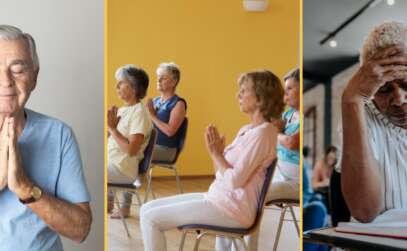“When I’m sixty-four”: challenges for older caregivers
When we talk about caring for seniors, it’s all to easy to assume the caregiver will be a younger person who is fit and able. In our private home care services team this may be true, but it’s not always the case when seniors are cared for by their family, friends or neighbours, who often tend to be older themselves.
Who are the senior caregivers?
A study by Statistics Canada looked at these older caregivers, defining them as
“People aged 65 and older who reported that, in the previous 12 months, they had either (a) cared for or helped someone who had a long-term health condition or a physical or mental disability, or (b) cared for or helped someone who had problems related to aging.”
1.5 million senior caregivers and rising
As we live longer and senior health care improves, the number of carers aged over 65 will inevitably increase. Already the numbers are substantial: almost a quarter of Canadians aged 65 or over provide care to family members with a long-term medical condition, disability, or age-related requirements in 2018.
For couples, the percentage of people caring for a spouse or partner increases significantly as both partners age.
- Aged 65 and older – 34%
- Aged 75 and older – 47%
- Aged 85 and older – 50%
Over 30% of senior caregivers spent 30 hours or more a week providing care and help. Senior women generally spent more hours caring / helping than senior men.
Senior caregivers and the pandemic
The pandemic has had a major influence on the level of care available from senior caregivers. As the survey report says:
“Many senior caregivers, especially those who help people living outside their household, may not have been able to provide care as they usually do. On the other hand, senior caregivers providing help to their spouse may have seen their burden of care increase, given the possible lack of other support during the pandemic. (In addition) many seniors will experience their own health and age-related challenges, resulting in some of them becoming caregivers and care receivers at the same time.”
Just over a fifth of senior caregivers were looking after a senior due to aging or frailty, rather than a specific condition. Another 11% were looking after someone with dementia. Whilst a reassuring 55% of senior caregivers describe the experience of caregiving as rewarding, 27% of senior caregivers said their overall health had suffered because of their care responsibilities. It adds up to a lot of stress and often physical work for an age group that should be enjoying a more gentle pace of life themselves.
Caregiving is hard work
Caregiving in the home may be rewarding but it’s also hard work, with one spouse or partner often taking on the entire responsibility of running the home, from cleaning and shopping to maintenance and finances. Even if they have support from family and friends, that help still needs to be organized and requested.
Sometimes, senior caregivers don’t like to ask for help due to pride, or not being sure of what help is available. In these cases, often the burden shifts onto their adult children, who in turn need to juggle caring for the caregivers and supporting them, with caring for their own families.
Home care for the caregivers
Home care services can help with the essentials of aging in place for both caregiver and care receiver. Our own team here at Vytality at Home can enable seniors to age in place in their own home by taking on the tasks they find difficult themselves. This can include doing the laundry, light housekeeping taking in shopping, organizing transport – in addition to personal care with washing, toileting and grooming as required. This takes off the burden of responsibility for these tsk from any senior caregiver.
Try it, you might like it
From first-hand experience, we have seen the difference regular home care can make for the caregiving spouse. For example, when we first talk, a senior caregiver may be reluctant to have us in their home, or feel care has been imposed on them by fate or by family (or both!). However, once the ‘trial’ care period starts and services are provided (often paid for by adult children), senior caregivers begin to see the benefits for their health and enjoyment. When we visit, they take the opportunity to be ‘off duty’, once again an individual, a spouse and parent rather than ‘just’ a caregiver. They begin to look a little happier and often, healthier. They enjoy chatting to the caregiver, watching the jobs getting done, and perhaps doing activities all together just for fun. Some take the opportunity for a nap and a period of ‘me’ time in the garden, or a trip into town without worry.
No-choice caring
This is important because 63% of senior caregivers said they had no choice but to become the caregiver. This rises to 78% for senior caregivers caring for a partner or spouse. What’s more, higher stress levels were reported for those who felt they had no choice, over twice as high as those who stated they had a choice. Home care can give back that choice to senior caregivers for the duration of our visits, offering a window of respite and relaxation.
Why not give home care a try?
As we’ve said, the prospect of home care can be daunting for senior caregivers. So we take time to listen to their requirements, explain what’s involved, and how we can help. We offer short-term respite care for senior caregivers who may need a break, are in hospital themselves, or who are recovering from illness.
We also provide respite care after adult children have noticed how Mom or Dad are struggling to cope with looking after their partner, and suggest they get some help just for a couple of weeks. Many of our senior caregiver clients start at a lower level of home care which is gradually increased as their needs and the needs of the care recipient change over time.
Professional home care in Calgary
If you’d like to discuss home care for yourself, your family or friend caregiver, or for senior relatives who themselves provide senior care, call us. We’ll talk through your particular situation and advice how home care could help making caring more satisfying and less stressful for senior caregivers and those receiving care too.




